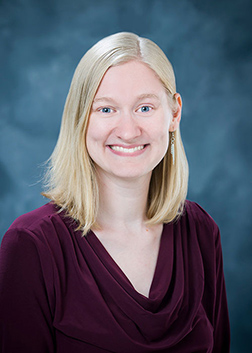Wood garners prestigious authorship appointment for comprehensive climate change report

Kimberly Wood
A geosciences faculty member has been appointed by the U.S. Global Change Research Program (GCRP) to join the fifth National Climate Assessment (NCA5) as a chapter author for the U.S. government’s premier report on climate change impacts, risks and adaptation across the nation.
Kimberly Wood, an assistant professor in the Department of Geosciences, was chosen by the GCRP for her expertise in hurricanes and climate change to help author the Southeast chapter of the annual report -- a congressionally mandated, interagency collaboration with experts from federal, state and local governments, as well as the academic, non-profit and private sectors. The NCA5 report will be available in late 2023 with multiple opportunities for public feedback prior to publication. More information is available at www.globalchange.gov.
In collaboration with other authors from the Southeast chapter team, Wood’s chapter will help policymakers and the general public understand current knowledge of climate change in the Southeast U.S. and apply the information to future decision making to mitigate its impacts.
“Beyond the interdisciplinary collaboration and networking opportunities that naturally spring from working closely with experts across the Southeast U.S., I’m honored to dedicate some of my time to discussing the increasingly complex challenges facing the Southeast, in part highlighted by the hyperactive 2020 Atlantic hurricane season,” Wood said. “Everyone on this chapter’s team cares deeply for the people and places in our region, and we wish to provide actionable information that incorporates the unequal impacts of climate change to support resilient urban and rural communities.”
Wood said extreme events are becoming “more extreme,” but notes much of the U.S. infrastructure is not capable of withstanding these changes, as evidenced by the effects of widespread freezing temperatures in February 2021, and Hurricanes Ida in 2021 and Laura in 2020.
“My most pressing concern is the impacts of these events on our daily lives, particularly on lower-income communities with fewer resources to handle hazards such as flooding and extreme heat. I strive to communicate these impacts so folks can evaluate how their own ways of life are affected and thus motivate dialogue and policy toward ensuring our communities can adapt and thus remain resilient in the face of these changes,” said Wood.
Wood was inducted in 2018 into the Early Career Leadership Academy by the American Meteorological Society, which aimed to develop and sustain a diverse network of early-career leaders in the weather, water and climate enterprise. She represented Mississippi in 2017 and 2018 at congressional events in Washington D.C. to discuss federal science funding and to educate policymakers on climate science.
For more than a decade Wood has studied tropical cyclone evolution, climatology and predictability using large datasets and open-source tools. Her work is featured in professional journals such as the Bulletin of the American Meteorological Society, Geophysical Research Letters and Monthly Weather Review.
Wood is currently funded by a National Science Foundation grant worth $622,000 in collaboration with colleagues at the University of Florida and Virginia Tech as well as scientists from the National Oceanic and Atmospheric Administration to assess influences on hurricane rainband structure and their representation in forecast models to help improve prediction of rainfall associated with these powerful storms.
An MSU faculty member since 2015, Wood earned her Ph.D. and master’s degree in atmospheric science from the University of Arizona. She received her bachelor’s degree in physics from Oregon State University.
Part of MSU’s College of Arts and Sciences, the Department of Geosciences is nationally recognized for its excellence in broadcast meteorology, weather forecasting, severe weather research, hydrometeorology, artificial intelligence, weather modeling and climate sciences. Complete details are available at www.geosciences.msstate.edu.
MSU is Mississippi’s leading university, available online at www.msstate.edu.
Sarah Nicholas | College of Arts and Sciences



